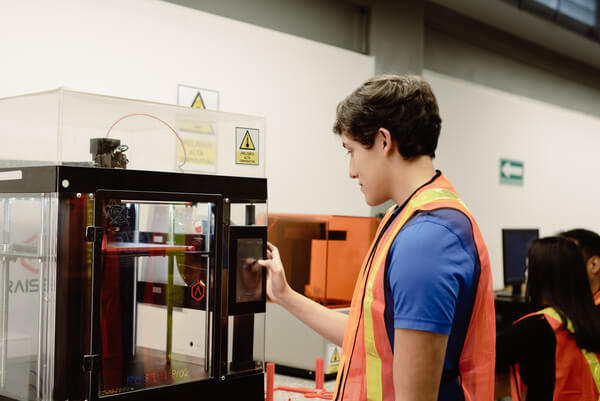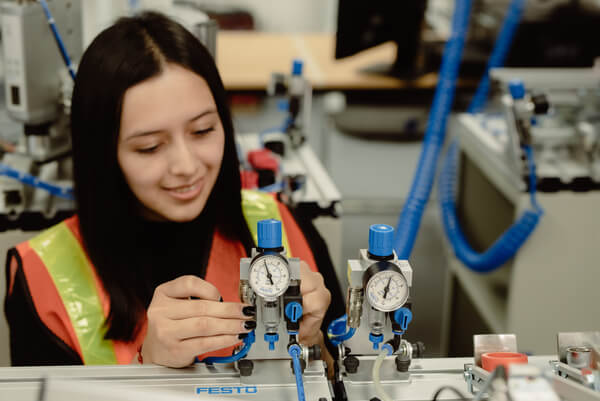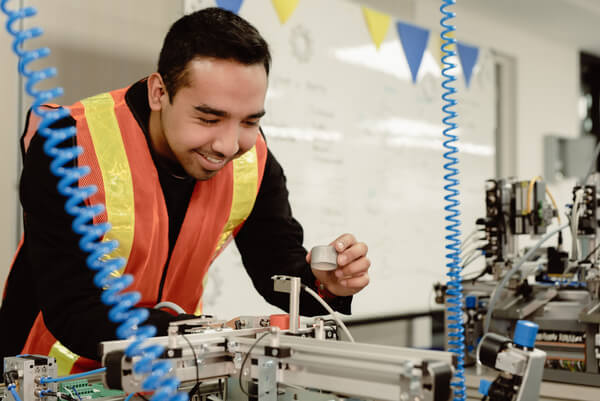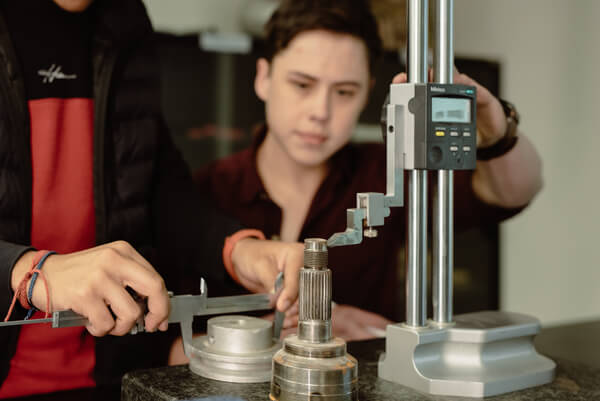Title : Bachelor in Industrial Engineering.
Duration: 9 semesters.
Modality: On site.
** The curriculum may be subject to changes.
The program in Industrial Engineering aims to prepare its graduates as integral professionals in engineering and operations management; to meet the requirements of design, management and optimization of production systems, supply chain management, quality, and industrial safety in public or private companies, both in manufacturing and services. Graduates will be able to analyze, formalize, and improve all the processes of the company at the global level of the organization. They will also become the driving force of productivity improvement, quality assurance, continuous improvement, and the implementation of integrated management systems.
- Employability greater than 90%
- Unique Technical and Administrative Engineering
- Broad scope of application
- Visits to prestigious companies throughout the country such as: assembly, metal-mechanic, oil, mining, food, packaging, graphic, textile, banking, insurance, and consulting industries
- Faculty with ties to the business world
- Laboratories to manufacture product prototypes and simulators.
- Flexible manufacturing simulators
- International certifications in quality, processes, projects, and logistics.
- Application of simulation and modeling software such as FlexSim, Inventor, Factory, Bizagi, among others
- We are the only Ecuadorian university accredited by WSCUC (Western Association of Schools and Colleges and University Commission).
- Employment in departments such as: Acquisitions, Quality, Production Processes, Maintenance, Engineering, Design and Development, Innovation, Projects, Operations, Logistics, Distribution, Industrial Safety, Human Resources, and Organizational Management
- Identify, formulate, and solve complex engineering problems; apply engineering design to produce solutions that meet specified needs; communicate effectively with a range of audiences; recognize ethical and professional responsibilities in engineering situations; function effectively on a team whose members together provide leadership; develop and conduct appropriate experimentation and acquire; and acquire new knowledge as needed.
- You will be able to access our professional internship agreements, capstone projects (cooperation projects), and visits to production, logistics or administrative centers of important multinational companies and SMEs in several sectors (assembly, metalworking, oil, mining, food, packaging, graphics, textiles, banking, insurance, and consulting). Collaboration agreements with international universities in Spain, Argentina, Brazil, Uruguay, and United States.
Graduates of Industrial Engineering can work in:
- Industrial Plants.
- Service Companies.
- Logistics, Distribution and Transportation Companies.
- Purchasing, Quality, Processes and Production Departments,
- Maintenance, Engineering, Design & Development, Innovation,
- Projects, Operations, Logistics, Distribution, Industrial Safety, Human Resources, among others.
An Industrial Engineer from Universidad de Las Américas (UDLA) is a competent, enterprising professional with an international-global vision who designs and optimizes operations through quality assurance, increased productivity, and innovative development of operational processes in manufacturing and service industries, focusing on safe working environments and environmentally friendly methods.
Graduates are able to identify, formulate and solve complex problems through the application of engineering, scientific, and mathematical principles. They apply industrial engineering designs to produce solutions that satisfy specific needs considering the fields of public health, safety, and welfare, as well as global, cultural, social, environmental, and economic factors. They also communicate effectively to a wide range of audiences specific to their discipline. Furthermore, they recognize ethical and professional responsibilities in engineering situations and make informed judgments, considering the impact of engineering solutions in global, economic, environmental, and social contexts. Moreover, they work effectively in a team whose members, together, exercise leadership, create a collaborative and inclusive environment, set, and accomplish goals, and plan tasks. Finally, they develop and conduct experiments, analyze and interpret data, use engineering judgment to draw conclusions and acquire and apply new knowledge as needed using appropriate learning strategies.
Graduates are expected to lead diverse multidisciplinary work teams in national and international contexts and conduct themselves in an ethical manner, exhibiting social responsibility, community service, and environmental awareness while contributing to the industry’s need for competitiveness, productivity, and quality.
- Optimize processes in organizations through the application of industrial engineering methodologies and tools.
- Manage multidisciplinary teams oriented to improve productivity and quality in organizations.
- Expand their knowledge and expertise to strengthen their professional skills throughout their lives.
- Add value to organizations by exercising their profession with values and ethical principles.
A graduate of the Industrial Engineering program will be able to:
- Identify, formulate, and solve complex engineering problems by applying principles of engineering, science, and mathematics.
- Apply engineering design to produce solutions that meet specified needs taking into consideration public health, safety, and welfare, as well as global, cultural, social, environmental, and economic factors.
- Communicate effectively with a range of audiences within the field.
- Recognize ethical and professional responsibilities in engineering situations and make informed judgments, which must consider the impact of engineering solutions in global, economic, environmental, and societal contexts.
- Function effectively on a team whose members together provide leadership, create a collaborative and inclusive environment, establish goals, plan tasks, and meet objectives.
- Develop and conduct appropriate experimentation, analyze, and interpret data, and use engineering judgment to draw conclusions.
- Acquire and apply new knowledge as needed, using appropriate learning strategies.
This committee addresses issues related to the fulfillment of the educational objectives, degree profile, and other academic aspects linked to the program’s development.
Responsibilities:
- Review the program’s educational objectives, degree profile, student learning outcomes, and plan of study.
- Propose changes or recommendations for the program’s educational objectives, degree profile, student learning outcomes, and plan of study.
- Review the results of the program annual operating plan.
- Review the program review report and action plan.
Committee Structure:
Description | Committee Members |
Dean of the College or its delegate | Diego Buenaño |
Highest authority of the program or its delegate | Christian Chimbo |
Professor in charge of graduate follow-up | César Larrea |
Representatives of employers and/or representatives of professional associations or guilds | Cristina Larrea |
Erick Zurita | |
Mariuxi Domínguez | |
Juan Manuel Loayza (President) | |
Carlos Zapater | |
Graduates | Ana Gabriela De La Calle |
Mery Gutiérrez Martínez | |
Lilia María Zúñiga Arellano | |
Dayana Elizabeth Moscoso Mosquera | |
Karen Stephanía García Portero | |
Francisco José Tobar Valdiviezo | |
Paola Carolina Moya De La Torre |
Bachelor Enrollment
| Academic Year | 2018 | 2019 | 2020 | 2021 | 2022 |
| Number of Students | 301 | 290 | 306 | 303 | 239 |
Bachelor Degrees Awarded
| Academic Year | 2018 | 2019 | 2020 | 2021 | 2022 |
| Number of Students | 56 | 31 | 40 | 42 | 70 |
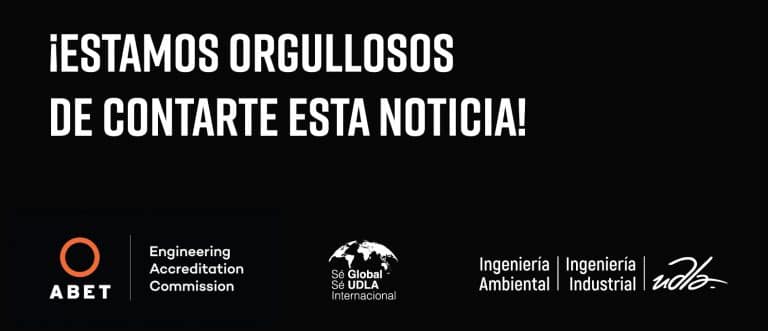 ABET is a global accreditor of university programs in applied and natural sciences, computing, engineering, and engineering technology.
ABET accreditation ensures that programs meet the standards to produce graduates ready to enter critical technical fields that are leading innovation and emerging technologies, anticipating the welfare and safety needs of society.
What benefits do students pursuing ABET-accredited programs have?
ABET is a global accreditor of university programs in applied and natural sciences, computing, engineering, and engineering technology.
ABET accreditation ensures that programs meet the standards to produce graduates ready to enter critical technical fields that are leading innovation and emerging technologies, anticipating the welfare and safety needs of society.
What benefits do students pursuing ABET-accredited programs have?
- Enhanced opportunities to access national and international employment.
- Facilitated attainment of professional engineering licensure in the United States.
- Instills confidence in the quality of the study programs by establishing international standards.
- Confers international recognition and prestige to graduates, academic programs, as well as UDLA.
- You can find more information about ABET accreditation at https://www.udla.edu.ec/2022/08/las-carreras-de-ingenieria-industrial-y-ambiental-recibe-la-acreditacion-abet/
If you are enrolled in another university, you can have your courses recognized through our simulator and study at UDLA.
Apply here

